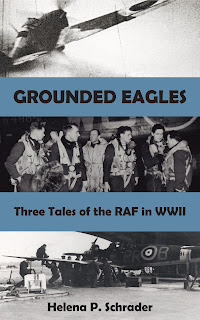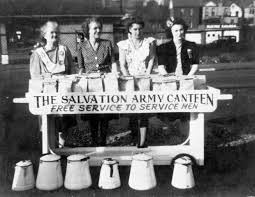RAF fighter pilots in the Battle of Britain were young. The average age was 20, and many pilots were still in their teens. The majority were too young to vote, and many did not have a driver's license. Most had not gone to the RAF cadet academy Cranwell and earned the king's commission. The majority were weekend fliers who'd joined the "Volunteer Reserve" or airmen who had been given the opportunity to learn to fly while doing other less glamorous ground duties. The bulk of both these latter categories were from the segments of society that didn't finish school much less go on to university and who did not have the money for private flying lessons. They became the backbone of Fighter Command: the Sergeant Pilots.
Today I introduce Sergeant Pilot George "Ginger" Bowles
Excerpt:
It could only be his Dad. No one else would phone him. Or had something happened to his Dad? What if he'd had some kind of accident? His father was doing that thatching job. What if he'd fallen off the roof and broken his back like Sanders? Ginger started moving faster. He hurried down the stairs. In the reception was a switchboard manned by a WAAF. She motioned him to one of the wooden pone booths, and a moment later the telephone in it rang. Ginger grabbed the receiver. "Bowles. Sergeant Pilot Bowles," he improved.
"Ginger?" It was his Dad's voice, and Ginger let out a long sigh of relief. "Did you hear the PM's speech last night, lad?" The senior Bowles sounded excited, almost breathless.
The swing in emotions had been too rapid, and Ginger found his eyes watering. Annoyed with his own weakness, acutely aware of his fragile nerves, Ginger answered with uncharacteristic cynicism. "I'm glad the PM thinks we're turning the tide of war, Dad, because frankly, it doesn't feel like that from where I'm standing."
Ginger comes form a poor, rural background. His widowed father makes a living doing odd jobs, and lives in a rundown old cottage without proper plumbing. Ginger's secondary education came entirely via scholarship, and getting accepted into the RAF Voluntary Reserve was the greatest moment of his short life.
Ginger loves flying but he's fundamentally an introvert and most happy out on his own walking his dog or playing among the clouds in an open cockpit biplane. He's not comfortable in a noisy crowd of fellow teenagers -- certainly not when they're drinking too much. He's even more intimidated by the upper class accents and manners of the officers.
But the biggest shock when he joins his first operational squadron at RAF Tangmere in late June 1940 is the Me109 that strafes the field just as he's coming out of the adjutant's office. When he'd joined the RAFVR, all he'd thought about was flying -- not fighting and dying. Suddenly, the war isn't in the newspapers anymore -- or in France either. It's in front of his face and he knows in the marrow of his bones that he isn't up to what's going to be asked of him.
He knows he's still a novice pilot. He knows that he knows nothing about dogfighting. Still struggling to fully master the powerful flying machine the RAF has entrusted him with, he can't keep formation to the standard the CO demands. Concentrating on staying in formation, however, he gets bounced by the Germans, further undermining his confidence. He's desperately afraid that he is the weakest link in the chain and that he endangers the entire squadron. The next time he sees the enemy, th physically tension causes him to be physically ill -- over the floor of his cockpit.
And yet... the ground crew is first rate. He knows they take pride in ensuring his aircraft is absolutely at its best. They won't let him clean up his own mess either. They say it's part of their job. They look after him. And the padre is nice too and wants to help. Ginger is determined to keep flying and to improve. He doesn't want to prove those people right, who have always looked down on his day and him as worthless trash.
Excerpt Continues:
"That's not the point, Ginger! I mean, it was what he said about what we all owe you. After the BBC broadcast, everyone started congratulating me -- people I hardly knew! Total strangers, even. They came up to me in the pub -- I was down to town to shop and stopped in 'fore coming home for just a quick one. But the radio was on, and after the PM spoke, everyone started slapping me on the back and congratulating me -- but it was all meant for you."
The thought of his despised and ridiculed father being the center of approving attention was so poignant that Ginger had to fight back tears again. He was glad that his father was still talking excitedly so he didn't need to speak. Mr Bowles was saying, "I had to tell you that, Ginger. The PM was speaking for all of us. We know you're all that stands between us and the Nazis. We know what the Nazis would do to us --if it weren't for you and your mates."
"They still might, Dad. No matter what the PM said, we haven't won yet." It came out rather harsh, because Ginger was so confused by his own emotions that he could only cope by being hard.
"I know, Ginger. But we're all behind you. And I've never been so proud in all my life."
"Thanks, Dad," Ginger's voice softened.
"Wish I could come and see you, lad. If I came to Chichester, could you get some time off? Just a couple of hours, I mean? Time for a quiet pint together?"
"It'd be an awful lot of trouble for you, Dad." Part of Ginger desperately wanted to see his Dad, but he was a little afraid of it, too. He couldn't introduce his Dad around to the others; they'd laugh at him for his country clothes, speech and manners.
"One day's all I'm asking for, lad. Or an afternoon. Just to see you again."
"Well, I suppose I could ask, but don't you think--"
"I'll look into it tomorrow. Now you take care of yourself, all right?"
"I do my best, Dad."
"I
know you do. That's how you got where you are. Take care of yourself!"
He shouted into the receiver and then hung up before Ginger could hear
how choked up he was -- but Ginger heard anyway. They knew each other
too well.
"This is the best book on the life of us fighter pilots in the Battle of Britain that I have ever seen.... I couldn't put it down."-- RAF Battle of Britain ace, Wing Commander Bob Doe.
Winner of a Hemingway Award for 20th Century Wartime
Fiction, a Maincrest Media Award for Military Fiction and Silver in the Global Book Awards.
Find out more at: https://crossseaspress.com/where-eagles-never-flew
they took the war to Hitler.
Their chances of survival were less than fifty percent.
Their average age was 21.
This is the story of just one bomber pilot, his crew and the woman he loved.
It is intended as a tribute to them all.
or Barnes and Noble.

For more information about all my books visit: https://www.helenapschrader.com










